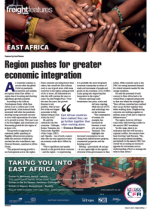Ea st Africa will play a central role in providing the world with the necessary critical minerals needed to power the clean energy agenda.According to Jose Fernandez, United States under-secretary for economic growth, energy, and the environment, the growing demand for critical minerals will pivot countries such as the Democratic Republic of the Congo (DRC) into the frontline.This comes as the International Energy Agency (IEA) predicts that demand for most minerals essential to the clean energy transition will increase by a factor of four to six. For some minerals, the increase will be exponential. By 2040, graphite demand will increase by 25 times, and lithium by 42 times. “But we have a problem,” said Fernandez. “Simply put, not only do we not have enough critical minerals to power the world’s clean energy agenda, but our current supply chains for these minerals – from extraction to production to recycling – are simply not diverse enough for the energy future that’s coming. And I don’t need to remind you of what happens when the supply chain breaks down or when we depend on a single supplier. We lived it during the Covid pandemic, and this is a vulnerability that we need to solve.”He said part of the solution was in assisting producing countries on the continent to improve supply chains and increase in-country beneficiation.“In our meetings, producing countries have emphasised their desire for investment in all stages of the critical minerals and battery materials value chains – not just mining, but also refining, battery production, and recycling. That makes all the sense in the world.”According to Fernandez, the United States is committed to assisting with this and earlier this year signed a memorandum of understanding with the DRC and Zambia to help them establish a new supply chain for EV batteries.“In addition, the US Export-Import Bank recently announced it would expedite the review of critical minerals projects under its Transformational Exports Programme, which is funded for up to $27 billion through to 2026. We’ve also focused on enlisting our private sectors to assist,” he said.According to the Centre for Strategic and International Studies (CSIS), East Africa holds potential for the US. Kenya, for example, has already indicated that it is seeking closer economic relations with the United States. This is a move Washington should welcome and embrace quickly, establishing a free trade agreement with the country before the expiry of the Africa Growth and Opportunity Act (Agoa) in 2025. The CSIS maintains that enhanced trade with and investment in democratic and modernising partners like Kenya would be a strategic win for the US in Africa.Speaking in Cape Town recently, Fernandez said not only East Africa, but all African countries were being seen as important partners by the US in pursuing shared global and regional priorities — from ending the Covid-19 pandemic and building back to a more inclusive global economy, to meeting the climate challenge and building more resilient energy systems

